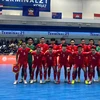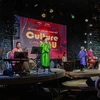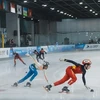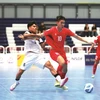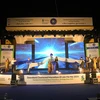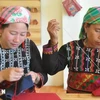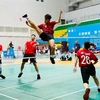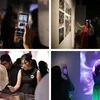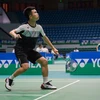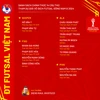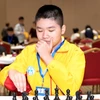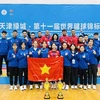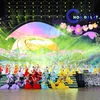On May 29, 2015, at Hanoi Opera House, the 19th Hennessy Concert Series once again captured the hearts and minds of chamber music audiences by the soulful duet of violist and pianist - Stefan Jackiw and Anna Polonsky.
With message about the journey from darkness and pain to light and hope, the music programme included four masterpieces that are imprinted with the style of contemporary chamber music.
The concert opened with Tzigane by Maurice Ravel. The rhapsody with strong feelings is the warm greetings of the two artists to Vietnamese audience. By choosing a skillful work as the first performance, Stefan Jackiw made listeners spellbound to his guitar sound. He conveyed a very clear idea of crazy gypsy sprit with rich emotional nuance by his prowess in handling the work.
It is not so easy for violist Stefan Jackiw to be recognized as the most outstanding representative of his generation. While enjoying his performance, the audience can feel that although his musical performance technique has reached a very high level, Stefan only sees performance technique as merely a tool. His violin’s sound goes far from the effect of technical skills, reaching a musical style that is blended between highest emotional energy and strong music intelligence.
The second performance, also the keynote of this concert was the masterpiece Partita by Polish composer Witold Lutoslawki. This is not only an important work of Lutoslawski but also a quintessential classical music piece of the twentieth century, which represented the contemporary spirit and innovation.
The piece consisted of five sections written with the typical improvisational impromptu technique of Lutoslawski. Although this piece was built upon the model of three main parts connected with two semi-improvisational free parts, it had no long breaks between each section, thus, forming a flexible and lively music experience. Strong emotional and dramatic qualities are characteristics throughout the entire work.
To Stefan Jackiw, when the violin’s sound lifts up is when he completely immerses in the music world of his own. His performing style brings the full meaning of the figure: living in music!
Although only appearing as the companion of Stefan Jackiw, Anna Polonsky remained a brightly indispensable half; her piano’s sound touched the listeners deeply and passionately.
The intersection between the two artists was the innovative spirit, the exploration and understanding of each other’s musical thinking. They formed an ideal duo on both performing and enjoying aspect.
The hall completely drenched in the darkness, leaving the only light from the small lamp that projected on the music sheet of the third piece – a serenade for solo violin by Finnish composer Kaija Saariaho wrote in 1994 when she heard that a close friend – her mentor – the composer Witold Lutoslawki had died.
Though it is a short work written on the substance of a concerto for violin, the music still has a strong impact when performing. The music conveys a deep sadness, the loss seems irreparable. These chords are playing very slowly with the high notes sound like choking attracting all the senses of the audience in a very dim light filled in the dark stage.
In endlessly applause from the audience after the end of the fourth piece, the two artists had returned to the stage to play a short piece that was not on the original programme - the Méditation of the opera Thais by composer Jules Massenet. The deep, melodic but extremely delicate tone gave a very satisfied yet nostalgia ending to Hanoi audience.
Hennessy Concert Series 19th again marked another successful season of this prestigious art series. Stefan Jackiw and Anna Polonsky not only bring Vietnamese chamber music fans an extraordinary music night but also a valuable opportunity to explore classical music and leading artists of contemporary classical music. Inspirational reflections were made on the continued developments that create the strong vitality of classical music today.-VNA
With message about the journey from darkness and pain to light and hope, the music programme included four masterpieces that are imprinted with the style of contemporary chamber music.
The concert opened with Tzigane by Maurice Ravel. The rhapsody with strong feelings is the warm greetings of the two artists to Vietnamese audience. By choosing a skillful work as the first performance, Stefan Jackiw made listeners spellbound to his guitar sound. He conveyed a very clear idea of crazy gypsy sprit with rich emotional nuance by his prowess in handling the work.
It is not so easy for violist Stefan Jackiw to be recognized as the most outstanding representative of his generation. While enjoying his performance, the audience can feel that although his musical performance technique has reached a very high level, Stefan only sees performance technique as merely a tool. His violin’s sound goes far from the effect of technical skills, reaching a musical style that is blended between highest emotional energy and strong music intelligence.
The second performance, also the keynote of this concert was the masterpiece Partita by Polish composer Witold Lutoslawki. This is not only an important work of Lutoslawski but also a quintessential classical music piece of the twentieth century, which represented the contemporary spirit and innovation.
The piece consisted of five sections written with the typical improvisational impromptu technique of Lutoslawski. Although this piece was built upon the model of three main parts connected with two semi-improvisational free parts, it had no long breaks between each section, thus, forming a flexible and lively music experience. Strong emotional and dramatic qualities are characteristics throughout the entire work.
To Stefan Jackiw, when the violin’s sound lifts up is when he completely immerses in the music world of his own. His performing style brings the full meaning of the figure: living in music!
Although only appearing as the companion of Stefan Jackiw, Anna Polonsky remained a brightly indispensable half; her piano’s sound touched the listeners deeply and passionately.
The intersection between the two artists was the innovative spirit, the exploration and understanding of each other’s musical thinking. They formed an ideal duo on both performing and enjoying aspect.
The hall completely drenched in the darkness, leaving the only light from the small lamp that projected on the music sheet of the third piece – a serenade for solo violin by Finnish composer Kaija Saariaho wrote in 1994 when she heard that a close friend – her mentor – the composer Witold Lutoslawki had died.
Though it is a short work written on the substance of a concerto for violin, the music still has a strong impact when performing. The music conveys a deep sadness, the loss seems irreparable. These chords are playing very slowly with the high notes sound like choking attracting all the senses of the audience in a very dim light filled in the dark stage.
In endlessly applause from the audience after the end of the fourth piece, the two artists had returned to the stage to play a short piece that was not on the original programme - the Méditation of the opera Thais by composer Jules Massenet. The deep, melodic but extremely delicate tone gave a very satisfied yet nostalgia ending to Hanoi audience.
Hennessy Concert Series 19th again marked another successful season of this prestigious art series. Stefan Jackiw and Anna Polonsky not only bring Vietnamese chamber music fans an extraordinary music night but also a valuable opportunity to explore classical music and leading artists of contemporary classical music. Inspirational reflections were made on the continued developments that create the strong vitality of classical music today.-VNA
